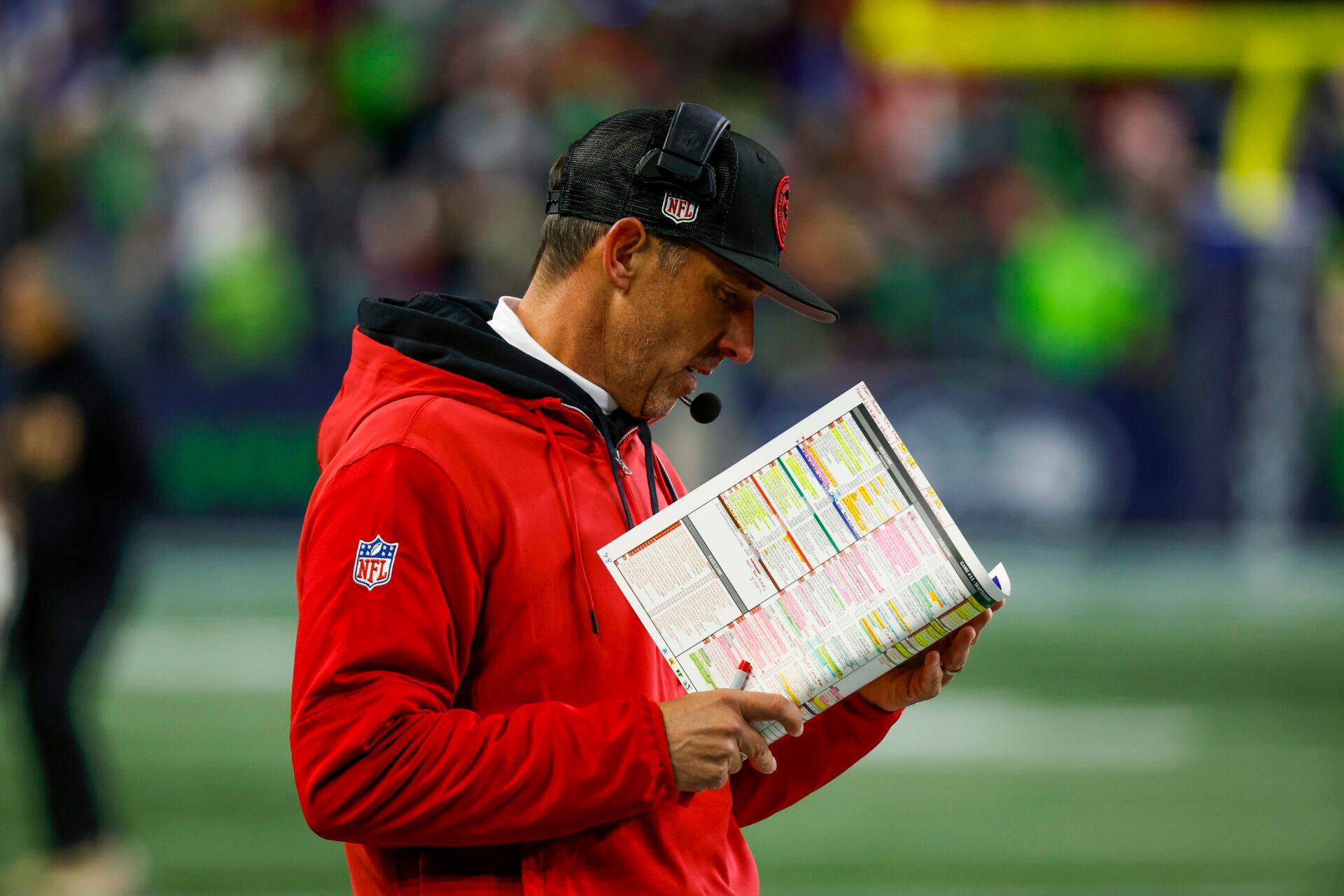Kyle Shanahan is widely regarded as one of the NFL’s top head coaches. His coaching career began in 2004 as an offensive quality control coach for the Tampa Bay Buccaneers, and he quickly climbed the ranks.
He comes from an NFL family, as his father, Mike, is also a legendary NFL coach. Let’s break down Kyle’s NFL coaching career and his journey to this point.

When Did Kyle Shanahan Become 49ers Head Coach?
The 49ers hired Shanahan as their head coach on Feb. 6, 2017, and he’s now in his eighth season in San Francisco. He replaced Chip Kelly, who was fired after just one 2-14 season.
Shanahan has guided the Niners to four NFC Championship Game appearances and two Super Bowls.
Every year that Shanahan has been to the playoffs with San Francisco, they have made the NFC Championship Game or the Super Bowl.
His sustained level of success shouldn’t be surprising. The Shanahan roots are firmly set in the NFL.
From a football family, Shanahan was always destined for NFL coaching success. His father, Mike Shanahan, is most known for his head-coaching stint with the Broncos, serving as their head coach from 1995 to 2008. He won two Super Bowls with the Broncos, defeating the Green Bay Packers in Super Bowl XXXII and the Atlanta Falcons in Super Bowl XXXIII. Shanahan is Denver’s all-time leader in regular-season games coached, regular-season wins, and playoff wins, and he was inducted into the Broncos’ Ring of Fame.
Like his son, he also coached the 49ers, serving as the team’s offensive coordinator for a few years and helping them win Super Bowl XXIX. In fact, Steve Young has credited Shanahan’s intense preparation for his record six-touchdown performance. Mike’s stint in San Francisco allowed a teenage Kyle to spend time around the franchise that he would later coach.
Shanahan’s Coaching Career
The father-son duo worked together in Washington when Kyle was the offensive coordinator under his father. However, Shanahan had to earn his opportunity at the highest level, working his way up the NFL coaching ranks.
Speaking in 2006, Mike said he had seen greatness in his son.
“He’s so much further ahead than I was at the same age it’s not even close,” Mike said. “He’s been around me, and he’s been on the field. He’s run routes against NFL defensive backs since he was a junior in high school. He’s been in the locker room during the offseason program. The first time I was on a pro practice field was when I was 31 years old.”
Kyle started his coaching career back in 2003 when he worked as a graduate assistant with the UCLA Bruins. He got his shot in the NFL a year later, becoming an offensive quality control coach with the Tampa Bay Buccanneers.
Quickly rising the NFL ranks, Shanahan joined the Houston Texans in 2006 as their wide receivers coach and tight ends coach before becoming the team’s offensive coordinator.
He stayed there until he had the opportunity to join his dad in Washington in 2010. After three seasons, Shanahan transitioned to the Cleveland Browns, continuing as an OC.
Never Forget when Kyle Shanahan and Mike McDaniel pulled off this legendary trick play with Johnny Manziel 😂pic.twitter.com/ApqudA9WnP
— Football Is Life (@FootbaIl_Tweets) February 22, 2023
However, he started receiving head-coaching buzz after thriving as the Atlanta Falcons offensive coordinator. Atlanta had one of the most explosive offenses in the NFL in 2016. The season ended in an overtime Super Bowl loss to the New England Patriots, but Shanahan solidified himself as one of the best offensive minds in the NFL.
KEEP READING: Who Are the NFL’s Highest-Paid Head Coaches?
The possibility of Shanahan leaving for a head-coaching position was discussed midseason, and he took multiple interviews during the team’s playoff run. Shanahan was announced as the 49ers’ new head coach just one day after the Super Bowl loss.
Now, the 44-year-old is considered one of the best coaches and offensive minds in football. Many teams have attempted to replicate the “Shanahan scheme” to varying degrees of success.
The annual dominance of Shanahan’s offense has led to many 49ers assistants leaving for better jobs, including head coaching gigs in recent years.

